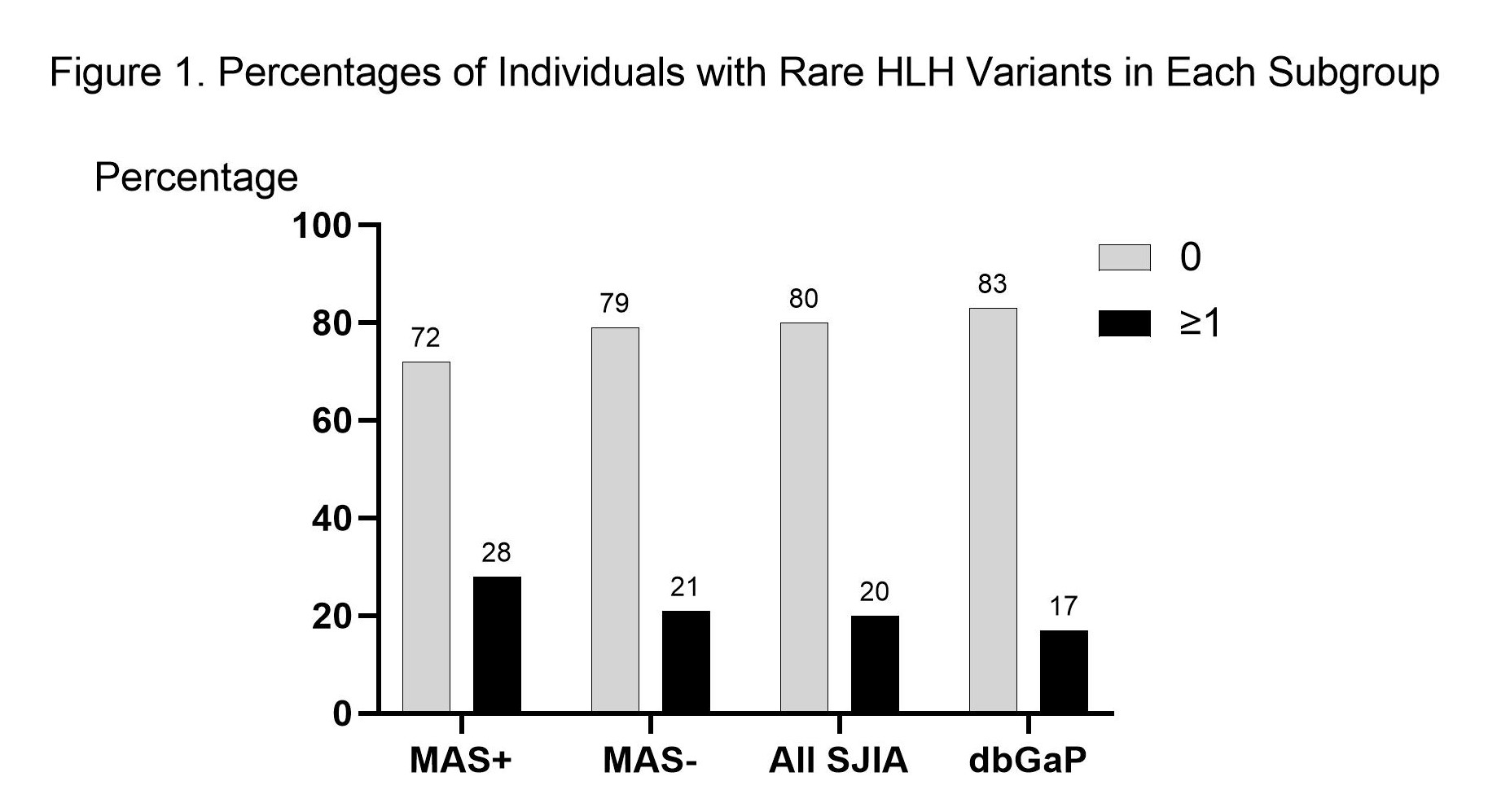Session Information
Session Type: Poster Session A
Session Time: 9:00AM-11:00AM
Background/Purpose: Systemic juvenile idiopathic arthritis (sJIA) is a complex inflammatory condition of childhood. It can be complicated by macrophage activation syndrome (MAS), a secondary form of hemophagocytic lymphohistiocytosis (HLH). Studies have identified an enrichment of HLH variants in sJIA patients with MAS compared with those without it. However, the role of these variants in sJIA in general is not known. The goal of our study is to determine whether rare variation in HLH genes contributes to the risk of developing sJIA.
Methods: Targeted sequencing of HLH genes (LYST, PRF1, RAB27A, STX11, STXBP2, UNC13D) was performed in sJIA subjects with European ancestry from the International Childhood Arthritis Genetics Consortium cohort using Illumina Nextera Custom Capture Assays and Illumina sequencers. Data processing and quality control were performed using a Genome Analysis Toolkit-based pipeline. Variants were filtered to retain high-quality, protein-altering variation on Ensembl canonical transcripts and stratified by minor allele frequencies (MAF). Healthy control exomes were extracted from the database for genotypes and phenotypes (accession number: phs000280.v8.p2). Rare variant association testing (RVT) was done with sequence kernel association test (SKAT). A burden test was also performed with the SKAT package. Significance was defined as p< 0.05 after 100,000 permutations.
Results: Sequencing data from 524 sJIA cases were jointly called and harmonized with exome-derived target data from 2952 controls. Subjects were excluded if they had a monogenic disease (n=6), dissimilar genetic ancestry (39 cases, 22 controls), or > 10% missingness (6 controls). Analysis of the remaining 479 sJIA cases revealed 71 rare HLH gene variants, including recurrent ultra-rare (MAF < 0.001) variants in LYST and UNC13D.We also observed 2 people in the sJIA cohort who had the STXBP2 mutation Ala429Val, which has been associated with secondary HLH and severe Covid. RVT comparing the variant distributions of sJIA cases and controls revealed a significant association with rare (MAF < 0.01) variants of STXBP2 (p=0.019) and ultra-rare variants of STXBP2 (p=0.006) and UNC13D (p=0.045). Sub-analysis of patients with known MAS status showed that the distribution of rare variants of UNC13D was different in 32 sJIA patients with MAS than in 90 without it (p=0.0047) or 2930 controls (p=0.03). There was an increased frequency of individuals with ≥1 rare HLH variants in all sJIA groups compared to the controls (Figure 1), with sJIA patients with a history of MAS having the highest frequency. Similarly, the full cohort (p=0.009) and those with MAS (p=0.025) had a higher burden of HLH variants than controls, whereas those without MAS did not (p=0.12).
Conclusion: We found that the association of HLH variants with sJIA is not purely linked to MAS. STXBP2 was significantly associated with sJIA while showing no association with MAS. Moreover, the frequency of HLH gene variants trended higher in MAS-negative sJIA than in control subjects. As seen in prior studies, UNC13D was associated with MAS. Taken together, this suggests that HLH variants may play a role in the pathophysiology of sJIA in general, and not only in MAS.
To cite this abstract in AMA style:
Correia Marques M, Rubin D, Shuldiner E, Datta M, Schmitz E, Grom A, Foell D, Gattorno M, Bohnsack J, Yeung R, Prahalad S, Mellins E, Anton Lopez J, Len C, Oliveira S, Woo P, Ozen S, Consortium I, Deng Z, Ombrello M. Enrichment of Rare Variants of Hemophagocytic Lymphohistiocytosis Genes in Systemic Juvenile Idiopathic Arthritis [abstract]. Arthritis Rheumatol. 2023; 75 (suppl 9). https://acrabstracts.org/abstract/enrichment-of-rare-variants-of-hemophagocytic-lymphohistiocytosis-genes-in-systemic-juvenile-idiopathic-arthritis/. Accessed .« Back to ACR Convergence 2023
ACR Meeting Abstracts - https://acrabstracts.org/abstract/enrichment-of-rare-variants-of-hemophagocytic-lymphohistiocytosis-genes-in-systemic-juvenile-idiopathic-arthritis/

